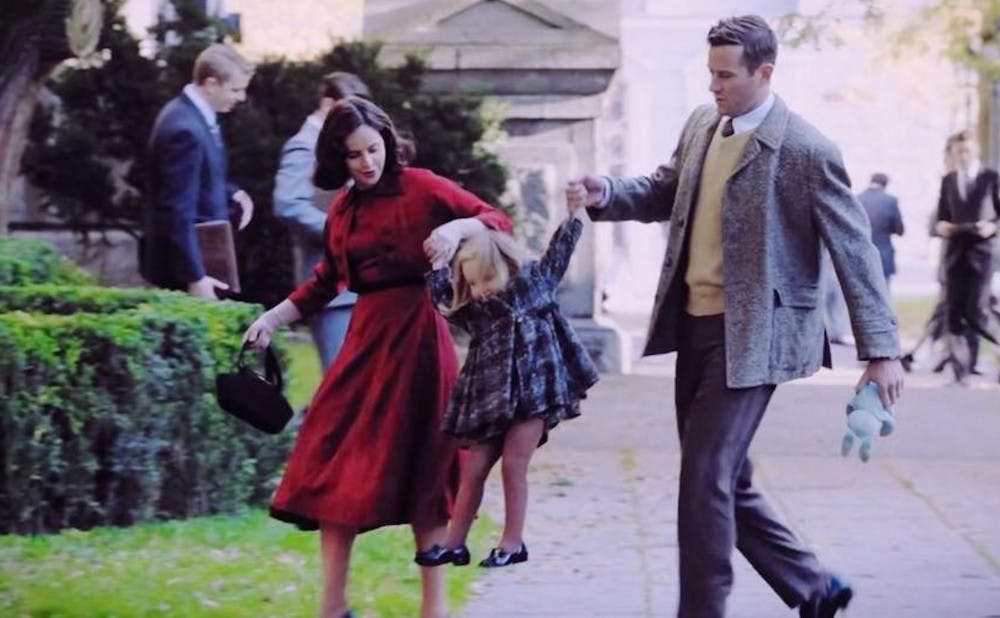After the release of the documentary "RBG" last year, a new film explores the origins of current Supreme Court Justice Ruth Bader Ginsburg.
In “On the Basis of Sex,” director Mimi Leder takes on the early career of renowned Supreme Court Justice Ruth Bader Ginsburg, from her beginnings at Harvard Law School through her finding her voice as an attorney in the Moritz case in the early 1970s. The film begins on a strong feminist note, as Ruth (Felicity Jones) criticizes the sexism of the Harvard Law professors and the harsh tone of Dean Griswold. However, Ruth proves herself when she begins attending both her classes and those of her husband, Martin (Armie Hammer), who is suffering from cancer. While Martin becomes a tax attorney in New York, every law firm turns Ruth down, causing her to accept a position as a professor at Rutgers, with a focus on gender discrimination in law. But Ginsburg finds her voice in a tax case regarding a bachelor who was refused a caretaker tax exemption due to his gender.
When I think of Ruth Bader Ginsburg, I think of a quiet, yet powerful and tough woman, and, for the majority of the film, Felicity Jones struggles to find the strength that is so characteristic of Ginsburg. Nevertheless, she pushes the envelope many times throughout the film and reaches a point with about 30 minutes left in the film where she unleashes her power.
Hammer struggles to escape playing the stock, “white-bread” supportive husband; however, given the strength inherent to the role of Ginsburg, the performance ends up coming off as a necessary counterpart. At times, he is bulldozed in scenes, but holds his own in the more personal scenes between Ruth and Martin. Although their roles were quite limited, veteran actors Kathy Bates, Sam Waterston and Stephen Root all contribute wisdom in their acting, with Bates contributing two very strong scenes — one opposite Ruth and her daughter Jane (Cailee Spaeney) and one opposite Theroux’s Wulf. Bates’ blunt feminism is paralleled in the role of Ruth’s daughter, Jane (Cailee Spaeney), so I wish the two could have had more time on screen together. The juxtaposition of the three generations creates a fascinating view of the progression of feminism.
Nevertheless, the best scene in the film comes in Mel Wulf’s office, where Wulf walks in to find Bates’ Dorothy Kenyon, who goes on to criticize his hesitation to help with the Moritz case. Theroux and Bates play off each other well in this scene, reflecting the excellence Theroux brings to the entire film. I absolutely loved every moment Theroux appeared on screen; yes, his character may have been somewhat dislikable at times in challenging Ruth’s instincts, but he plays the role incredibly well. This charisma is highlighted by his introduction, where he performs a camp song to embarrass Ruth.
At many times watching this film, I felt frustrated that I was watching Ginsburg as the baby bird struggling to leave the nest instead of as the strong, ever-present mother bird she has become. I understand that Leder and writer Daniel Stiepleman wanted to focus on Ginsburg’s early career, but this decision may have made the film inherently weaker. However, the duo could not spread the narrative over her entire life, as the documentary “RBG” did, since good biopics are specific and focused. Still, Leder and Stiepleman did a good job making an entertaining, well-acted film with a very underrated supporting performance and an excellent score. Both "On the Basis of Sex" and "RBG" are worth seeing, creating complementing pictures of a distinctly important and powerful figure in the American legal system.
Get The Chronicle straight to your inbox
Signup for our weekly newsletter. Cancel at any time.

